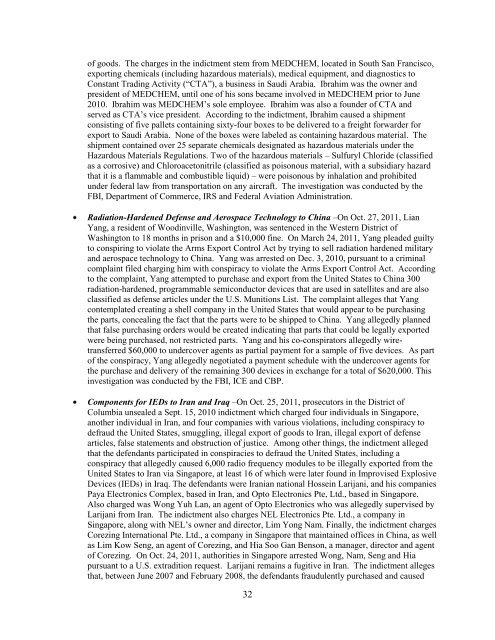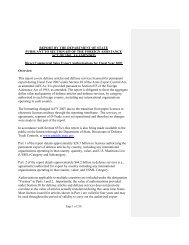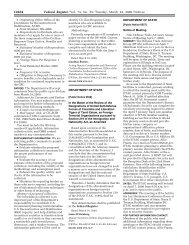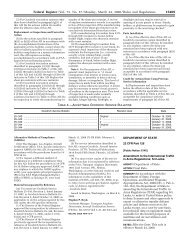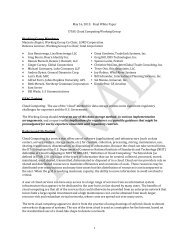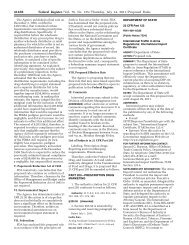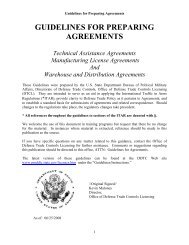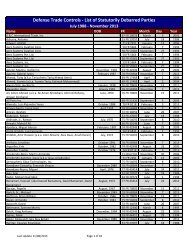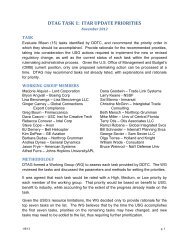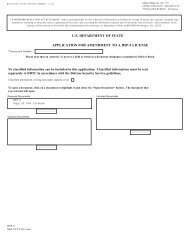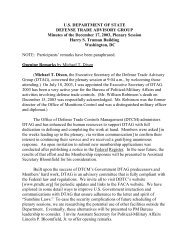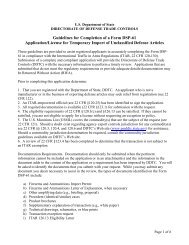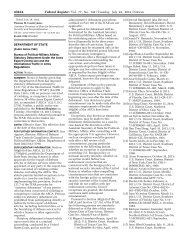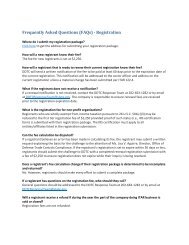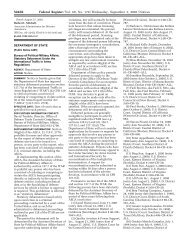Major Export Enforcement Cases - Directorate of Defense Trade ...
Major Export Enforcement Cases - Directorate of Defense Trade ...
Major Export Enforcement Cases - Directorate of Defense Trade ...
Create successful ePaper yourself
Turn your PDF publications into a flip-book with our unique Google optimized e-Paper software.
<strong>of</strong> goods. The charges in the indictment stem from MEDCHEM, located in South San Francisco,<br />
exporting chemicals (including hazardous materials), medical equipment, and diagnostics to<br />
Constant Trading Activity (“CTA”), a business in Saudi Arabia. Ibrahim was the owner and<br />
president <strong>of</strong> MEDCHEM, until one <strong>of</strong> his sons became involved in MEDCHEM prior to June<br />
2010. Ibrahim was MEDCHEM’s sole employee. Ibrahim was also a founder <strong>of</strong> CTA and<br />
served as CTA’s vice president. According to the indictment, Ibrahim caused a shipment<br />
consisting <strong>of</strong> five pallets containing sixty-four boxes to be delivered to a freight forwarder for<br />
export to Saudi Arabia. None <strong>of</strong> the boxes were labeled as containing hazardous material. The<br />
shipment contained over 25 separate chemicals designated as hazardous materials under the<br />
Hazardous Materials Regulations. Two <strong>of</strong> the hazardous materials – Sulfuryl Chloride (classified<br />
as a corrosive) and Chloroacetonitrile (classified as poisonous material, with a subsidiary hazard<br />
that it is a flammable and combustible liquid) – were poisonous by inhalation and prohibited<br />
under federal law from transportation on any aircraft. The investigation was conducted by the<br />
FBI, Department <strong>of</strong> Commerce, IRS and Federal Aviation Administration.<br />
Radiation-Hardened <strong>Defense</strong> and Aerospace Technology to China –On Oct. 27, 2011, Lian<br />
Yang, a resident <strong>of</strong> Woodinville, Washington, was sentenced in the Western District <strong>of</strong><br />
Washington to 18 months in prison and a $10,000 fine. On March 24, 2011, Yang pleaded guilty<br />
to conspiring to violate the Arms <strong>Export</strong> Control Act by trying to sell radiation hardened military<br />
and aerospace technology to China. Yang was arrested on Dec. 3, 2010, pursuant to a criminal<br />
complaint filed charging him with conspiracy to violate the Arms <strong>Export</strong> Control Act. According<br />
to the complaint, Yang attempted to purchase and export from the United States to China 300<br />
radiation-hardened, programmable semiconductor devices that are used in satellites and are also<br />
classified as defense articles under the U.S. Munitions List. The complaint alleges that Yang<br />
contemplated creating a shell company in the United States that would appear to be purchasing<br />
the parts, concealing the fact that the parts were to be shipped to China. Yang allegedly planned<br />
that false purchasing orders would be created indicating that parts that could be legally exported<br />
were being purchased, not restricted parts. Yang and his co-conspirators allegedly wiretransferred<br />
$60,000 to undercover agents as partial payment for a sample <strong>of</strong> five devices. As part<br />
<strong>of</strong> the conspiracy, Yang allegedly negotiated a payment schedule with the undercover agents for<br />
the purchase and delivery <strong>of</strong> the remaining 300 devices in exchange for a total <strong>of</strong> $620,000. This<br />
investigation was conducted by the FBI, ICE and CBP.<br />
Components for IEDs to Iran and Iraq –On Oct. 25, 2011, prosecutors in the District <strong>of</strong><br />
Columbia unsealed a Sept. 15, 2010 indictment which charged four individuals in Singapore,<br />
another individual in Iran, and four companies with various violations, including conspiracy to<br />
defraud the United States, smuggling, illegal export <strong>of</strong> goods to Iran, illegal export <strong>of</strong> defense<br />
articles, false statements and obstruction <strong>of</strong> justice. Among other things, the indictment alleged<br />
that the defendants participated in conspiracies to defraud the United States, including a<br />
conspiracy that allegedly caused 6,000 radio frequency modules to be illegally exported from the<br />
United States to Iran via Singapore, at least 16 <strong>of</strong> which were later found in Improvised Explosive<br />
Devices (IEDs) in Iraq. The defendants were Iranian national Hossein Larijani, and his companies<br />
Paya Electronics Complex, based in Iran, and Opto Electronics Pte, Ltd., based in Singapore.<br />
Also charged was Wong Yuh Lan, an agent <strong>of</strong> Opto Electronics who was allegedly supervised by<br />
Larijani from Iran. The indictment also charges NEL Electronics Pte. Ltd., a company in<br />
Singapore, along with NEL’s owner and director, Lim Yong Nam. Finally, the indictment charges<br />
Corezing International Pte. Ltd., a company in Singapore that maintained <strong>of</strong>fices in China, as well<br />
as Lim Kow Seng, an agent <strong>of</strong> Corezing, and Hia Soo Gan Benson, a manager, director and agent<br />
<strong>of</strong> Corezing. On Oct. 24, 2011, authorities in Singapore arrested Wong, Nam, Seng and Hia<br />
pursuant to a U.S. extradition request. Larijani remains a fugitive in Iran. The indictment alleges<br />
that, between June 2007 and February 2008, the defendants fraudulently purchased and caused<br />
32


